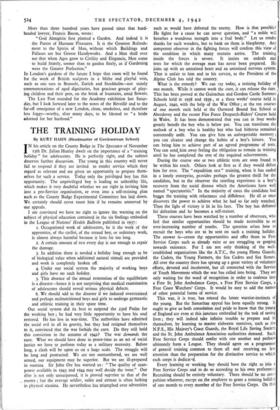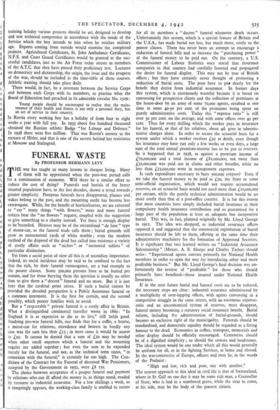THE TRAINING HOLIDAY
By KURT HAHN (Headmaster of Gordonstoun School)
I am convinced we have no right to ignore the warning on the subject of physical education contained in the six findings embodied in the League of Nations' Health Bulletin published in 1937:
1. Occupational work of adolescents, be it the work of the apprentice, of the cyclist, of the errand boy, or sedentary work, is almost always harmful because it lasts far too long.
2. A certain amount of rest every day is not enough to repair the damage.
3. In addition there is needed a holiday long enough to be of biological value when additional natural stimuli are provided and work is completely broken off.
4. Under our social system the majority of working boys and girls have no such holiday.
5. This absence of the annual restoration of the equilibrium is a disaster—hence it is not surprising that medical examination of adolescents should reveal serious physical defects.
6. We should add to the disaster if we induced overstrained and perhaps malnutritioned boys and girls to undergo gymnastic and athletic training in their spare time.
Our social system did its best to suspend the 23rd Psalm for the working boy ; he had very little opportunity to have his soul restored. He has less in war-time. The authorities have admitted the social evil in all its gravity, but they had resigned themselves to it, convinced that the war forbids the cure. Do they still hold this conviction in the autumn of 1942? The war demands the cure. What we should have done in peace-time as an act of social justice we have to perform today as a military necessity. Before long, a clash will be upon us on a huge scale. The struggle will be long and protracted. We are not outnumbered, we are well armed, our equipment may be superior. But we are ill-prepared in stamina. Sir John Orr has warned us: " The quality of man- power available in 1943 and 1944 may well decide the issue." Our elite is not only unsurpassed, it is proved superior to that of the enemy ; but the average soldier, sailor and airman is often lacking in physical stamina. He nevertheless has triumphed over adversities
such as would have defeated the enemy. How is that possible?
He fights for a cause he can never question, and " a noble will breathes a wondrous Strength into a frail body." Let us render thanks for such wonders, but to bank on them is blasphemy. Any competent observer in the fighting forces will confirm this view of the condition in which many recruits arrive. The training inside the forces is severe. It insists on ordeals and tests for which the average man has never been prepared. He joins up with an untrained heart and an untrained nervous system. That is unfair to him and to his service, as the President of the Alpine Club has told the country.
What is the remedy? We can say today, a training holiday of one month. While it cannot work the cure, it can release the cure.
This has been proved at the Guisachan and Gordon Castle Summer Schools held in 1938 and 1939 , at a three weeks' course held in August, 1940, with the help of the War Office ; at the ten courses of one month each held at the Outward Bound Sea School at Aberdovey and the recent Fire Force Despatch-Riders' Course held in Wales. It has been demonstrated that you can in four weeks greatly benefit the boy who is below par. You can transform the outlook of a boy who is healthy but who had hitherto remained contentedly unfit. You can give him an unforgettable memory ; you can cleanse and change the habits of a boy's leisure. You can bring him to achieve part of an agreed programme of tests. You can send, him away feeling the obligation to remain in training until he has completed the rest of the required achievements.
During the course one or two athletic tests are soon found to be within his reach. Others look at first as if they would defeat him for ever. The " expedition test " training, when it has ended in a lonely enterprise, provides perhaps the greatest thrill for the candidate, but to the observer the startling experience is a boy's recovery from the social disease which the Americans have well named " spectatoritis." In the majority of cases the candidate had begin the training with reluctance and diffidence. He all at once discovers the power to achieve what he had so far only watched. Then the light of victory is lit in his face. The boy has defeated his defeatism and he becomes a self-trainer.
These courses have been watched by a number of observers, who feel that similar opportunities should be made accessible to an ever-increasing number of youths. The question arises how to recruit the boys who are to be sent on such a training holiday. The answer is—create the opportunities and offer them to Free Service Corps such as already exist or are struggling or groping towards existence. For I am not only thinking of the well- established organisations like the A.T.C., the young Home Guards, the Cadets, the Young Farmers, the Sea Cadets and Sea Scouts.
All over the country there has sprung up a great variety of voluntary efforts, devoted and incoherent, but all connected with the Service of Youth Movement which the war has called into being. They are
only waiting for the word of recognition in order to coalesce into a Free St. John Ambulance Corps, a Free First Service Corps, a Free Coast Watchers' Corps. It would be easy to add the names of other potential forms of service.
This war, it is true, has rotised the latent warrior-instincts of the young. But the Samaritan appeal has been equally strong. It ought to give us both consolation and pride to know that the young of England are even at this juncture enthralled by the task of saving lives ; they will indeed take infinite trouble to prepare and fit themselves, by learning to master elaborate exercises, such as the N.F.S., His Majesty's Coast Guards, the Royal Life Saving Society and the St. John Ambulance Association authorities demand. Such Free Service Corps should confer with one another and perhaps ultimately form a League. They should agree on a programme of general training common to them all and receiving no less attention than the preparation for the distinctive service to which each corps is dedicated.
Every learning or working boy should have the right to join a Free Service Corps and to do so according to his own preference. Recruiting should be entirely voluntary. There should be no com- pulsion whatever, except on the employer to grant a training holid:y of one month to every member of the Free Service Corps. On this
training holiday various projects should be set, designed to develop and test technical competence in accordance with the needs of the Service which the boy intends to join when he reaches military age. Experts coming from outside would examine the completed projects. Agricultural Certificates, St. John Ambulance Certificates, N.F.S. and Coast Guard Certificates would be granted to the suc- cessful candidates, just as the Air Force today attests to members of the A.T.C. that they have passed their proficiency test. Lectures on democracy and dictatorship, the origin, the issue and the progress of the war, should be included in the time-table of these courses. Athletic training should take place daily.
There would, in fact, be a covenant between the Service Corps and between each Corps with its members, to practise what the Board of Education had preached in its admirable circular No. 1529; Young people should be encouraged to realise that the main-, tenance of their health and fitness is not only a personal duty, but an act of service to their country. • In Russia every working boy has a holiday of from four to eight weeks a year with full pay. In 1933 about five hundred thousand obtained the Russian athletic Badge "for Labour and Defence." In 1938 there were five million. That was Russia's answer to the menace of Hitler, and that is one of the secrets behind her resistance at Moscow and Stalingrad.



























 Previous page
Previous page